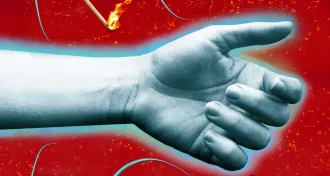Humans
Sign up for our newsletter
We summarize the week's scientific breakthroughs every Thursday.
-
 Humans
HumansWhat’s in your wallet? Another ‘estrogen’
A chemical cousin of bisphenol A, a hormone mimic, has turned up on banknotes from around the world in addition to tainting 14 other types of papery products. Owing to the near ubiquity of BPS in paper, human exposure is likely also “ubiquitous,” conclude the study's authors. Oh, and a second new study shows that BPS behaves like an estrogen.
By Janet Raloff -
 Health & Medicine
Health & MedicineMore adults put off kids’ vaccinations
Scientists say the practice has no proven value and poses risks of infection.
By Nathan Seppa -
 Health & Medicine
Health & MedicineLike a prion, Alzheimer’s protein seeds itself in the brain
Injecting amyloid-beta into mice may induce misfolding of native amyloid-beta molecules, leading to the buildup associated with the neuron-killing disease.
-
 Tech
TechThe descent of music
Using an evolutionary process, researchers create pleasing tunes out of grating noise.
-
 Humans
HumansColor this chimp amazing
An extra layer of sensory perception called synesthesia might help ape make a monkey of humans on memory tests.
-

-

-

-
 Health & Medicine
Health & MedicineInternal Time
Chronotypes, Social Jet Lag, and Why You're So Tired by Till Roenneberg.
By Science News -
 Health & Medicine
Health & MedicineWhy Calories Count
From Science to Politics (California Studies in Food and Culture) by Marion Nestle and Malden Nesheim.
By Science News -
 Health & Medicine
Health & MedicineExperiment Eleven
Dark Secrets Behind the Discovery of a Wonder Drug by Peter Pringle
-
 Neuroscience
NeuroscienceHurt Blocker
The next big pain drug may soothe sensory firestorms without side effects.